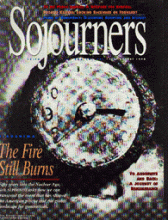Anne Morrison Welsh remembers every detail of that day 30 years ago. Her husband, Norman Morrison, who served as executive secretary of a Quaker community in Baltimore, was home sick with a cold. He had just finished reading an article by a priest in SouthVietnam about the bombing of a village there.
"I remember we were in the kitchen," says Anne. "I was preparing lunch. We had French onion soup. I've never liked French onion soup since." Although Norman had resisted taxes, demonstrated, and lobbied in Washington, he said to her, "It's not enough. What can be done to stop this war?"
Anne recounts, "I'll never forget what I said: 'I don't know what more can be done. All I know is that we shouldn't despair.'"
Anne put their 1-year-old daughter, Emily, down for a nap and left to pick up their older children, Ben, 6, and Christina, 5, at school. When they returned, Norman and Emily were gone. Anne was making supper when the phone rang. A reporter asked her, "Are you aware that your husband has made a protest in Washington?"
Soon after, an official from the Fort Myer Infirmary at the Pentagon called. He explained that Norman had set himself on fire. He assured Anne that Emily was fine. Eyewitnesses gave conflicting reports about what had happened: Some say Norman laid Emily down on the pavement before soaking himself with kerosene, others say that he handed her to a passerby.
"Whether he thought of it that way or not, I think having Emily with him was a final and great comfort to Norman," says Anne. "And she was a powerful symbol of the children we were killing with our bombs and napalm-who didn't have parents to hold them in their arms. The important thing is that he released her. If he had taken Emily-and he could have-it would have been almost unbearable."
Read the Full Article
